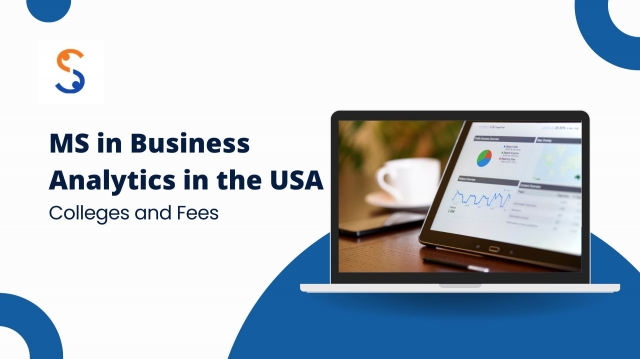Absolutely! I can help craft a detailed and engaging piece on pursuing an MS in Business Analytics in the USA. Since I don't have direct access to external content, I'll provide a comprehensive overview based on common themes and elements associated with such programs. If you need specific details from that link, you might want to include or mention those separately. Here's a broad outline and content for a 1500-word article:
Pursuing an MS in Business Analytics in the USA: A Comprehensive Guide
In today's data-driven world, the ability to interpret and utilize data is more crucial than ever. This is where an MS in Business Analytics comes into play. As businesses increasingly rely on data to drive decisions, the demand for skilled professionals who can analyze complex datasets and provide actionable insights has surged. This guide explores why pursuing an MS in Business Analytics in the USA is a smart career move, what to expect from the program, and how to choose the right institution.
Why Pursue an MS in Business Analytics?
-
The Growing Importance of Data
Data has become a central asset for organizations across all industries. From retail to healthcare, the ability to harness and analyze data is key to understanding market trends, improving operational efficiencies, and enhancing customer experiences. An MS in Business Analytics equips students with the skills necessary to leverage data effectively, making them invaluable assets to employers.
-
Career Opportunities
The demand for business analysts is robust and growing. According to the U.S. Bureau of Labor Statistics, employment in business and financial operations occupations, which includes roles like business analysts, is expected to grow significantly. Companies are looking for professionals who can not only manage and interpret data but also apply insights to strategic decision-making. An MS in Business Analytics opens doors to roles such as Data Analyst, Business Intelligence Analyst, and Data Scientist.
-
Competitive Advantage
In a competitive job market, having an advanced degree can set you apart from other candidates. An MS in Business Analytics demonstrates a deep understanding of data analysis, statistical methods, and business strategy, providing a competitive edge. This advanced education often translates into higher earning potential and more significant career advancement opportunities.
What to Expect from an MS in Business Analytics Program
-
Core Curriculum
Typically, an MS in Business Analytics program covers a range of core subjects designed to build a strong foundation in both analytics and business strategy. Key courses often include:
- Data Analysis and Visualization: Techniques for interpreting and presenting data effectively.
- Statistical Methods: Statistical tools and methods for analyzing data.
- Predictive Analytics: Using historical data to predict future trends and behaviors.
- Big Data Technologies: Understanding and working with large-scale data systems and technologies.
- Business Strategy: Aligning data insights with business goals and strategies.
-
Hands-On Experience
Many programs emphasize practical experience, often through projects, internships, or capstone courses. These opportunities allow students to apply theoretical knowledge to real-world problems, gain industry experience, and build a portfolio of work that demonstrates their skills to potential employers.
-
Technology and Tools
A significant portion of the curriculum is dedicated to teaching the latest tools and technologies used in business analytics. This may include:
- Statistical Software: Such as R, SAS, or SPSS.
- Programming Languages: Like Python or SQL for data manipulation and analysis.
- Data Visualization Tools: Such as Tableau or Power BI.
Choosing the Right Program
Selecting the right MS in Business Analytics program involves evaluating several factors:
-
Accreditation and Reputation
Ensure that the program is accredited and recognized for its quality. Accreditation from reputable bodies ensures that the program meets high educational standards. Research the program's reputation and the success of its alumni to gauge its effectiveness.
-
Curriculum and Specializations
Review the curriculum to ensure it aligns with your career goals and interests. Some programs offer specializations or electives in areas such as marketing analytics, financial analytics, or operations analytics. Choose a program that offers the courses and focus areas that are most relevant to your career aspirations.
-
Faculty Expertise
Look into the faculty's background and expertise. Faculty members with real-world experience and strong academic credentials can provide valuable insights and mentorship. Research their publications, industry connections, and involvement in analytics projects.
-
Location and Networking Opportunities
Consider the location of the program. Being in a major business hub can provide additional networking opportunities and access to a broader range of companies and industries. Networking is a crucial component of career development, and being in a vibrant business environment can enhance these opportunities.
-
Flexibility and Format
Evaluate the format of the program. Some institutions offer full-time, part-time, or online options to accommodate different schedules and commitments. Choose a format that best fits your personal and professional life.
The Admission Process
-
Application Requirements
The application process for an MS in Business Analytics typically includes:
- Transcripts: Academic records from previous institutions.
- GMAT/GRE Scores: Some programs may require standardized test scores, although others might waive this requirement based on work experience or academic performance.
- Letters of Recommendation: Typically from academic or professional references who can attest to your capabilities and potential.
- Statement of Purpose: An essay outlining your career goals, reasons for pursuing the program, and how it aligns with your aspirations.
- Resume/Curriculum Vitae: A detailed account of your professional and academic background.
-
Interviews
Some programs may require interviews as part of the admissions process. This is an opportunity for the admissions committee to assess your fit for the program and for you to ask questions about the program and its culture.
Financing Your Degree
-
Scholarships and Grants
Research available scholarships and grants that can help offset the cost of the program. Many institutions offer merit-based or need-based financial aid.
-
Assistantships
Some programs provide teaching or research assistantships that can provide financial support and valuable experience. Check if these opportunities are available and how to apply.
-
Loans
Student loans are another option to consider. Evaluate loan terms and repayment plans to find a solution that fits your financial situation.
Conclusion
Pursuing an MS in Business Analytics in the USA is a significant investment in your future. With the growing importance of data in the business world, this degree provides a solid foundation in analytics, enhances your career prospects, and opens doors to a wide range of opportunities. By carefully selecting a program that aligns with your goals and preparing thoroughly for the admissions process, you can position yourself for success in this dynamic and rewarding field.
Read More :
- Study in UK
- Study in Australia
- Study in New Zealand
- Study in Canada
- Study in USA
- Study in Ireland






